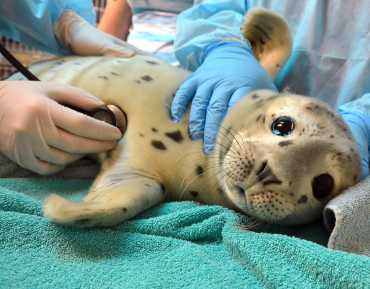
ABC News: Scientists Discover How Whales Can Sing and How Shipping Noise Disrupts Communication
- Behavior
- Species conservation
- Natural history
Scientists discover how whales can sing under water and how shipping noise can disrupt communication
Published on ABC News: February 21, 2024
A discovery on how baleen whales are able to sing under water is giving scientists a better understanding on how noise pollution from shipping activity can alter marine mammal's ability to communicate -- and therefore thrive as a species.
When the ancient ancestors of whales returned to the ocean from land, they developed major adaptations to make vocal communication feasible under water, according to a study published in Nature on Wednesday.
The greatest threats to marine mammals are caused by people, but we can also be their greatest champions.
Sign up for email from The Marine Mammal Center to stay updated on how you can support solutions and be an advocate and champion for marine mammals.
{"image":"\/Animals\/Wild\/Humpback whale\/cropped-images\/whale-tail-with-bridge-and-ships-shutterstock-3-7-4898-3826-1663722256.jpg","alt":"whale tails visible above water under the Golden Gate Bridge with shipping traffic in the distance","title":"Whale Safe \u2013 an AI-enabled System to Prevent Ship Collisions with Whales \u2013 to Launch off the San Francisco Coastline","link_url":"https:\/\/www.marinemammalcenter.org\/news\/whale-safe-to-launch-off-the-san-francisco-coastline","label":"Press Release","date":"2022-09-21 04:00:00","type":"news"}

Whale Safe – an AI-enabled System to Prevent Ship Collisions with Whales – to Launch off the San Francisco Coastline
September 21, 2022
Read More{"image":"\/Animals\/Wild\/Other species\/cropped-images\/leaping-dolphin-container-ship-shutterstock-4-0-2560-2000-1672429328.jpg","alt":"dolphin leaping in front of a giant container ship","title":"ZEIT Online: How to Save a Whale","link_url":"https:\/\/www.marinemammalcenter.org\/news\/zeit-online-how-to-save-a-whale","label":"In the News","date":"2022-12-30 01:00:00","type":"news"}

{"image":"\/Animals\/Wild\/Humpback whale\/cropped-images\/two-whales-under-golden-gate-bridge-shutterstock-646-1-3946-3083-1663782644.jpg","alt":"two whales surfacing below the Golden Gate Bridge","title":"New York Times: New System Aims to Save Whales Near San Francisco From Ship Collisions","link_url":"https:\/\/www.marinemammalcenter.org\/news\/new-york-times-new-system-aims-to-save-whales-near-san-francisco-from-ship-collisions","label":"In the News","date":"2022-09-21 02:00:00","type":"news"}

New York Times: New System Aims to Save Whales Near San Francisco From Ship Collisions
September 21, 2022
Read More{"image":"\/Animals\/Wild\/Gray whale\/cropped-images\/gray-whale-san-francisco-bay-with-ship-by-bill-keener-c-the-marine-mammal-center-22-3-1925-1504-1670545385.jpg","alt":"whale tail above the water with a ship in the distance","title":"NBC: Cruises & Cargo Ships Regularly Break Voluntary Speed Limit Aimed at Protecting Endangered Whales","link_url":"https:\/\/www.marinemammalcenter.org\/news\/nbc-cruises-cargo-ships-regularly-break-voluntary-speed-limit-aimed-at-protecting-endangered-whales","label":"In the News","date":"2022-12-05 09:26:58","type":"news"}

NBC: Cruises & Cargo Ships Regularly Break Voluntary Speed Limit Aimed at Protecting Endangered Whales
December 5, 2022
Read MoreYes, I want to save a life!

Yes, I want to save a life!
You’ll be giving sick and injured animals the best possible care at the Center’s state-of-the-art hospital. With your gift today, you are giving a patient a second chance at life in the wild.
See Our Latest News
{"image":"\/Animals\/Wild\/Elephant seal\/cropped-images\/wild-es-ano-nuevo-photo-by-clive-beavis-159-0-1270-992-1772151576.jpg","alt":"wild northern elephant seal at ano nuevo state park","title":"Avian Influenza Confirmed in Northern Elephant Seals","link_url":"https:\/\/www.marinemammalcenter.org\/news\/avian-influenza-confirmed-in-northern-elephant-seals","label":"News Update","date":"2026-02-26 01:00:00"}

{"image":"\/Animals\/Wild\/Gray whale\/cropped-images\/two-gray-whales-golden-gate-bridge-shutterstock-0-0-1270-992-1770234810.jpg","alt":"two gray whales under the Golden Gate Bridge","title":"The Marine Mammal Center and San Francisco Harbor Safety Committee Pilot New Vessel Operator Training Program","link_url":"https:\/\/www.marinemammalcenter.org\/news\/the-marine-mammal-center-and-san-francisco-harbor-safety-committee-pilot-new-vessel-operator-training-program","label":"Press Release","date":"2026-02-06 01:00:00"}

The Marine Mammal Center and San Francisco Harbor Safety Committee Pilot New Vessel Operator Training Program
February 6, 2026
Read More{"image":"\/Animals\/Wild\/Bottlenose dolphin\/cropped-images\/dolphinphoto-by-adam-li-c-noaa-0-0-1270-992-1769539954.jpg","alt":"A bottlenose dolphin jumps out of the water.","title":"What\u2019s the Difference Between Dolphins and Porpoises? And Other Animal Trivia","link_url":"https:\/\/www.marinemammalcenter.org\/news\/whats-the-difference-between-dolphins-and-porpoises-and-other-animal-trivia","label":"News Update","date":"2026-01-26 23:00:00"}

What’s the Difference Between Dolphins and Porpoises? And Other Animal Trivia
January 26, 2026
Read More{"image":"\/Animals\/Patients\/Sea otters\/2025\/cropped-images\/so-mooring-release-2-laurie-miller-c-the-marine-mammal-center-USFWS-permit-MA101713-1-147-8-1270-992-1770307740.jpg","alt":"Sea otter - Mooring","title":"Rescue Stories: Southern Sea Otter Mooring Named the 2025 Patient of the Year","link_url":"https:\/\/www.marinemammalcenter.org\/news\/rescue-stories-vote-for-your-favorite-marine-mammal-patient-of-2025","label":"News Update","date":"2026-01-16 10:05:08"}

Rescue Stories: Southern Sea Otter Mooring Named the 2025 Patient of the Year
January 16, 2026
Read More


